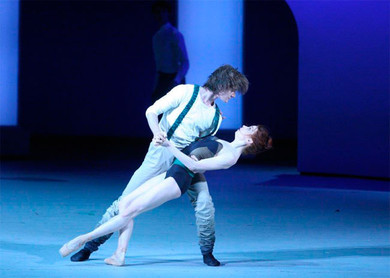New Stage
| 21 June |
| 19:00 |
| 2024 | Friday |
|
The Taming of the Shrew Ballet |
|
| Artists |
Credits |
Augustin Maillot, Costume Designer Dominique Drillot, Lighting Designer Ernest Pignon-Ernest, Set Designer
|
Premiere of this production: 04 Jul 2014 The performance has 1 intermission Running time: 2 hours 5 minutes
The Taming of the Shrew is a comedy by William Shakespeare, believed to have been written between 1590 and 1594. Rather than a macho handbook, The Taming of the Shrew can be construed as an encounter between two forces of nature, who recognise one another at last. If they are abrupt, obnoxious, it stems from their solitude; they are fundamentally different from the society they live in, albatrosses among sparrows, and their excesses signal that they have yet to find a man (or a woman) who can measure up to them. Their love is out of the ordinary: while Petruchio could appear to be interested only in Baptista’s fortune, once the ink is dry on their marriage certificate, he doesn’t let go of Katharina. If he is interested, it’s by this woman; the real dowry, the actual gold mine, it’s her. He still needs to put her through a series of challenges to make sure that he wasn’t mistaken, that they are right for each other — measure for measure, so to speak. He was right. So was she. If she gives in to her husband’s demands, it’s not because she has found her master, but because she has met her match. Her submissiveness is an act. It hardly matters whether or not the sun is the moon, because the two of them have their own, extra-ordinary light. Petruchio isn’t fooled by by his wife’s new attitude. For the outside world, however, the prevalent social norms are safe. Everyone can breathe a sigh of relief: even the most reluctant among them have complied. In truth, Katharina and Petruchio play their parts in perfect harmony, and their singular tune sets them apart in what is a game of artifice. SynopsisPrior to the first act, an induction frames the play as a "kind of history" played in front of a befuddled drunkard named Christopher Sly who is tricked into believing that he is a lord.
In the play performed for Sly, the "Shrew" is Katherina Minola, the eldest daughter of Baptista Minola, a Lord in Padua. Katherina's temper is notorious, and extremely volatile, and it is thought that no man can control her, and no man would ever wish to marry her. On the other hand, her younger sister Bianca is nubile and much sought after by the nobles. Baptista however has sworn not to allow his younger daughter to marry before Katherina is wed, much to the despair of her suitors, Hortensio and Gremio, who agree that they will work together to marry off Katherina so that they will be free to compete for Bianca.
The plot becomes considerably more complex when two strangers, Petruchio and Lucentio, arrive in town (although not together). Lucentio, the son of the great Vincentio of Pisa, instantly falls in love with Bianca. Petruchio, for his part, seems interested only in money and fine jewels.
When Baptista mentions that the only men who will be permitted to attend Bianca are tutors, Hortensio disguises himself as a music tutor named Litio, and Lucentio disguises himself as Cambio, a tutor of philosophy. Gremio then encounters Lucentio, and presents him to Baptista, whilst Hortensio convinces Petruchio to present him to Baptista. Thus, Lucentio and Hortensio, pretending to be teachers, attempt to woo Bianca behind her father's back.
Meanwhile, Petruchio is told by Hortensio about the large dowry that would come with marrying Katherina. Petruchio quickly negotiates the dowry with Baptista, then marries Katherina in a farcical ceremony during which, amongst other things, he strikes the priest, and then takes her home against her will. Once there, he begins the "taming" of his new wife – he keeps her from sleeping by blowing a trumpet, invents reasons as to why she cannot eat, and buys her beautiful clothes only to rip them up with a crudely forged bread knife. When Katherina, profoundly shaken by her experiences, is told that they are to return to Padua for Bianca's wedding to Lucentio (actually Lucentio's servant Tranio in disguise), she is only too happy to comply. By the time they arrive however, Katherina's taming is complete and she is either unable or unwilling to resist Petruchio. She demonstrates her complete subordination to his will by agreeing that she will regard the moon as the sun, and the sun as the moon.
Meanwhile Bianca marries the real Lucentio, after the Lucentio/Tranio subterfuge is exposed, and Hortensio, realizing he has no hope of winning Bianca, marries a rich widow. During the banquet, Petruchio brags that his wife, formerly untameable, is now completely obedient. Baptista, Hortensio, and Lucentio are incredulous and the latter two believe that their wives are more obedient. Petruchio proposes a wager in which each will send a servant to call for their wives, and whichever wife comes most obediently will have won the wager for her husband. Katherina is the only one of the three who responds, winning for Petruchio the wager. At the end of the play, after the other two wives have been summoned, Katherina gives them a soundly-reasoned speech on the subject of why wives should always obey their husbands. The play ends with Baptista, Hortensio and Lucentio marvelling at how Petruchio has thoroughly tamed the shrew.
|
|
Main Stage
1 Teatralnaya ploschad (1 Theatre Square), Moscow, Russia
New Stage
Bol'shaya Dmitrovka Street, 4/2, Moscow, Russia
|


